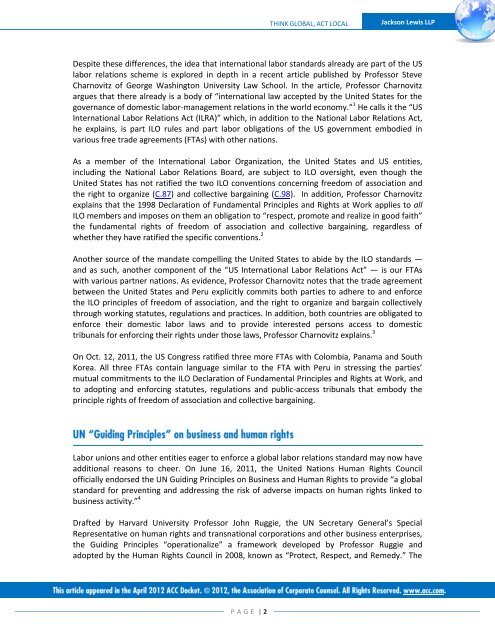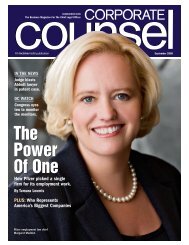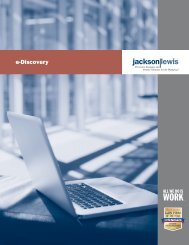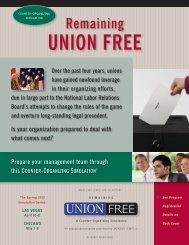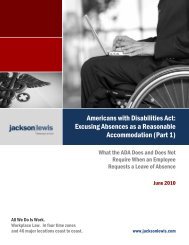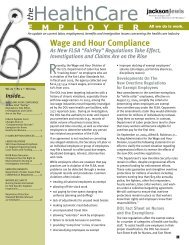Think Global, Act Local - Jackson Lewis
Think Global, Act Local - Jackson Lewis
Think Global, Act Local - Jackson Lewis
Create successful ePaper yourself
Turn your PDF publications into a flip-book with our unique Google optimized e-Paper software.
THINK GLOBAL, ACT LOCAL<strong>Jackson</strong> <strong>Lewis</strong> LLPDespite these differences, the idea that international labor standards already are part of the USlabor relations scheme is explored in depth in a recent article published by Professor SteveCharnovitz of George Washington University Law School. In the article, Professor Charnovitzargues that there already is a body of “international law accepted by the United States for thegovernance of domestic labor-management relations in the world economy.” 1 He calls it the “USInternational Labor Relations <strong>Act</strong> (ILRA)” which, in addition to the National Labor Relations <strong>Act</strong>,he explains, is part ILO rules and part labor obligations of the US government embodied invarious free trade agreements (FTAs) with other nations.As a member of the International Labor Organization, the United States and US entities,including the National Labor Relations Board, are subject to ILO oversight, even though theUnited States has not ratified the two ILO conventions concerning freedom of association andthe right to organize (C.87) and collective bargaining (C.98). In addition, Professor Charnovitzexplains that the 1998 Declaration of Fundamental Principles and Rights at Work applies to allILO members and imposes on them an obligation to “respect, promote and realize in good faith”the fundamental rights of freedom of association and collective bargaining, regardless ofwhether they have ratified the specific conventions. 2Another source of the mandate compelling the United States to abide by the ILO standards —and as such, another component of the “US International Labor Relations <strong>Act</strong>” — is our FTAswith various partner nations. As evidence, Professor Charnovitz notes that the trade agreementbetween the United States and Peru explicitly commits both parties to adhere to and enforcethe ILO principles of freedom of association, and the right to organize and bargain collectivelythrough working statutes, regulations and practices. In addition, both countries are obligated toenforce their domestic labor laws and to provide interested persons access to domestictribunals for enforcing their rights under those laws, Professor Charnovitz explains. 3On Oct. 12, 2011, the US Congress ratified three more FTAs with Colombia, Panama and SouthKorea. All three FTAs contain language similar to the FTA with Peru in stressing the parties’mutual commitments to the ILO Declaration of Fundamental Principles and Rights at Work, andto adopting and enforcing statutes, regulations and public-access tribunals that embody theprinciple rights of freedom of association and collective bargaining.Labor unions and other entities eager to enforce a global labor relations standard may now haveadditional reasons to cheer. On June 16, 2011, the United Nations Human Rights Councilofficially endorsed the UN Guiding Principles on Business and Human Rights to provide “a globalstandard for preventing and addressing the risk of adverse impacts on human rights linked tobusiness activity.” 4Drafted by Harvard University Professor John Ruggie, the UN Secretary General’s SpecialRepresentative on human rights and transnational corporations and other business enterprises,the Guiding Principles “operationalize” a framework developed by Professor Ruggie andadopted by the Human Rights Council in 2008, known as “Protect, Respect, and Remedy.” TheP A G E | 2


